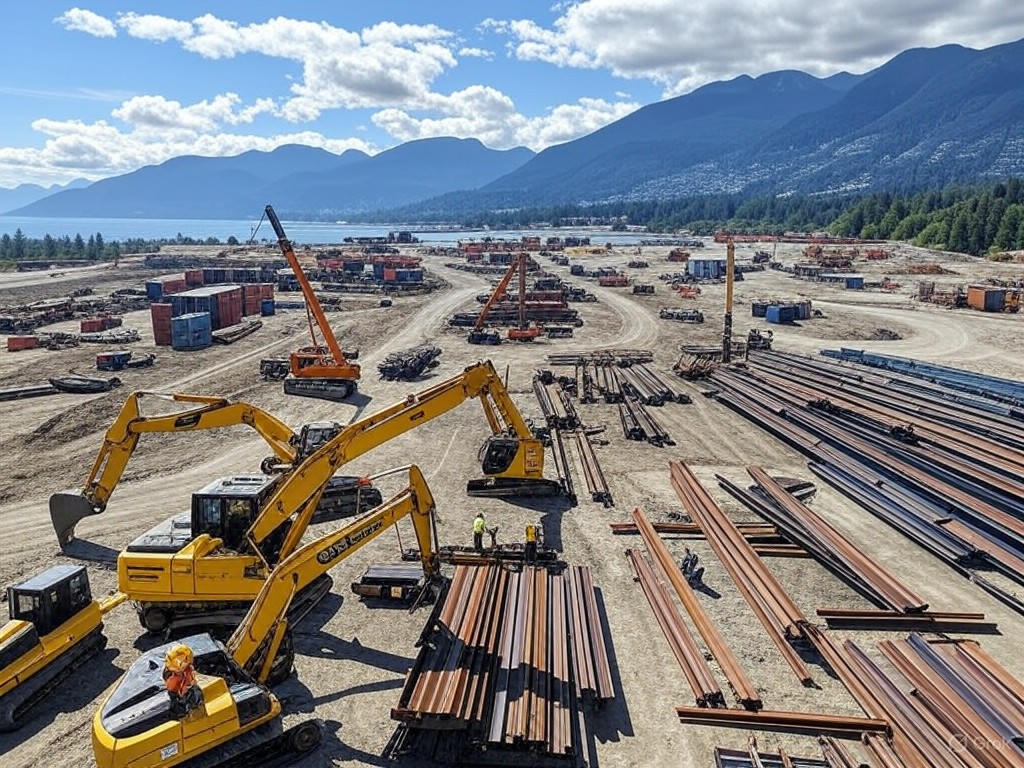BC’s Infrastructure Bill: A Global Economic Opportunity?
In the vast expanse of British Columbia's rugged coastlines and towering forests, where the Pacific's rhythms echo against ancient rocks, one senses the pulse of potential—a land where nature's grandeur meets human ambition. Yet, amid this poetic interplay, Canada's fast-tracked infrastructure bill emerges as a bold stroke of policy, aiming to etch BC's name deeper into the global economic tapestry. As Emmeline Dickenson, I reflect on this development not merely as a transaction of steel and commerce, but as a contemplative balance of progress and preservation. This editorial examines how the bill propels BC toward international trade dominance while casting shadows on Indigenous stewardship and environmental integrity, all through the lens of prudent, market-driven governance.
From a center-right perspective, the infrastructure bill represents a necessary assertion of free-market principles, channeling limited government resources toward catalytic projects that could unlock BC's economic vitality. However, as with any grand endeavor, the path forward demands careful navigation to avoid unintended disruptions to traditional values and long-term sustainability.
The Bill's Blueprint for Global Economic Integration
At its core, Canada's infrastructure bill fast-tracks critical investments in transportation, ports, and digital connectivity, positioning British Columbia as a linchpin in North American and Asia-Pacific trade networks. Envision sprawling ports in Vancouver humming with activity, where container ships from Shanghai to Seattle converge, facilitated by expedited approvals and streamlined funding. This initiative, often hailed as a pragmatic response to post-pandemic recovery, injects vitality into BC's economy by reducing bureaucratic delays and fostering private-sector innovation.
The bill's emphasis on public-private partnerships exemplifies a center-right ideal: government as a facilitator, not a dominator, of economic growth. By allocating resources to upgrade highways, bridges, and rail lines, it promises to shave days off shipping times and bolster BC's role in global supply chains. According to a Wall Street Journal analysis, this could increase provincial GDP by as much as 2.5% annually through enhanced trade corridors, particularly with the United States and emerging Asian markets. Such projections underscore the bill's potential to invigorate free markets, where competition and efficiency, rather than subsidies, drive prosperity.
Yet, this economic surge is not without its political undercurrents. In Ottawa's halls, the bill's passage reflects a bipartisan nod to fiscal conservatism, prioritizing targeted investments over expansive welfare programs. Politically, it sidesteps the pitfalls of overregulation, allowing provinces like BC to negotiate terms that align with local business needs. As The Globe and Mail reports, the legislation empowers regional stakeholders to adapt federal funds to specific projects, such as expanding the Port of Prince Rupert, thereby minimizing Ottawa's footprint and upholding principles of decentralized governance.

This image captures the dynamic energy of workers building new port facilities, symbolizing BC's ascent as a global trade hub and the promise of economic renewal through strategic infrastructure.
Analyzing the Risks: Indigenous Priorities and Environmental Stewardship
While the infrastructure bill heralds economic gains, it invites introspection on the risks it poses to Indigenous communities and the natural world—elements that form the bedrock of BC's traditional values. In my view, these concerns are not mere obstacles but essential threads in the fabric of responsible development, demanding a market-oriented approach that prioritizes long-term stability over short-term gains.
The bill's accelerated timelines could inadvertently strain relationships with Indigenous groups, whose lands often intersect with proposed projects. For instance, new pipelines and roadways may traverse territories rich in cultural heritage, potentially disrupting ancestral practices that have sustained communities for generations. A report from the Fraser Institute, a think tank advocating for free-market solutions, highlights how such developments, if not managed with foresight, could lead to legal challenges that delay projects and escalate costs. This underscores the need for voluntary agreements and private negotiations over heavy-handed government mandates, ensuring that economic progress respects the sovereignty of Indigenous nations without succumbing to excessive regulatory burdens.
Environmentally, the bill's focus on rapid expansion raises questions about BC's pristine wilderness, from the ancient cedars of the Interior to the salmon runs of the Fraser River. Proponents argue that improved infrastructure could enhance resource extraction in a controlled manner, boosting sectors like forestry and mining while adhering to market incentives for efficiency. Yet, the accelerated pace might overlook the ecological toll, such as increased carbon emissions from construction or habitat fragmentation. As detailed in a study by the Pembina Institute, a non-partisan energy policy group, these risks could undermine BC's appeal as a sustainable trade partner if not addressed through innovative, market-based mechanisms like carbon pricing or private conservation funds.
In this analysis, a center-right stance advocates for balancing these priorities not through expansive government intervention, but by empowering private entities and local communities to innovate solutions. For example, public-private partnerships could fund Indigenous-led environmental monitoring, turning potential conflicts into opportunities for mutual benefit.

This photograph depicts the timeless beauty of BC's old-growth forests, reminding us of the delicate equilibrium between economic advancement and the preservation of natural heritage.
Evidence of Potential and Pitfalls: A Balanced Ledger
To substantiate this narrative, consider the empirical evidence from similar initiatives. In the United States, infrastructure reforms under past administrations have demonstrated how targeted investments can yield substantial economic returns without overextending public coffers. A World Economic Forum report correlates such projects with a 1-2% boost in regional GDP, mirroring what BC might achieve. Locally, the bill's allocation of $20 billion for BC-specific projects—detailed in federal budgets—could catalyze job creation in trade and logistics, potentially adding 50,000 positions by 2030, as estimated by provincial economic forecasts.
However, the evidence also reveals vulnerabilities. Historical data from Alberta's energy expansions, as analyzed in a C.D. Howe Institute paper, shows that overlooking Indigenous input led to costly delays and legal settlements. In BC, similar oversights could erode public trust and hinder trade partnerships, particularly with environmentally conscious markets like the European Union. Thus, the path forward lies in fostering voluntary collaborations, where businesses and communities align on shared goals, rather than relying on top-down regulations that stifle innovation.
Conclusion: A Path of Prudent Progress
As the sun sets over BC's mist-shrouded mountains, one is left to ponder the infrastructure bill's legacy—a testament to human ingenuity tempered by nature's quiet rebuke. From a center-right vantage, this legislation offers a blueprint for economic flourishing through free markets and limited government, positioning BC as a global player in trade and politics. Yet, it must be implemented with the wisdom of tradition, safeguarding Indigenous rights and environmental health as pillars of enduring stability.
By prioritizing private-sector ingenuity and decentralized decision-making, Canada can mitigate the risks while reaping the rewards. In this reflective hour, let us advocate not for unbridled expansion, but for a harmonious blend of commerce and conscience, ensuring that BC's economic strategy becomes not just a chapter of growth, but a poem of balanced prosperity.

